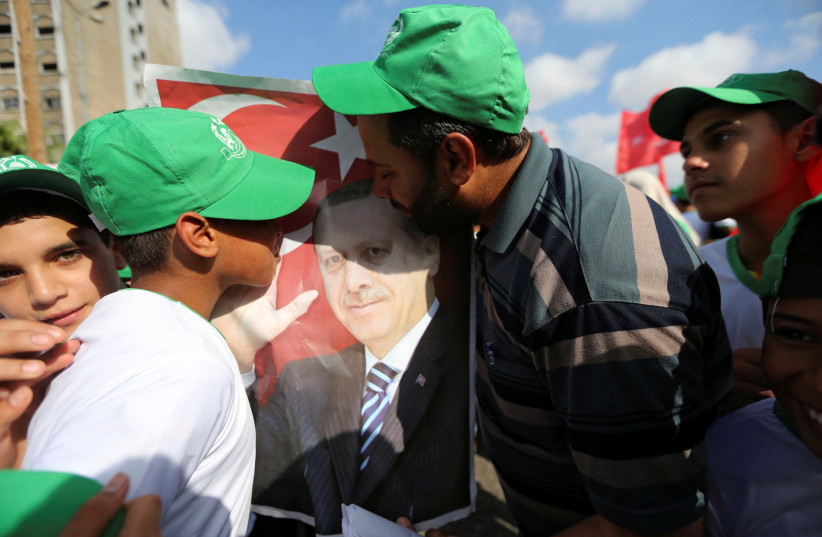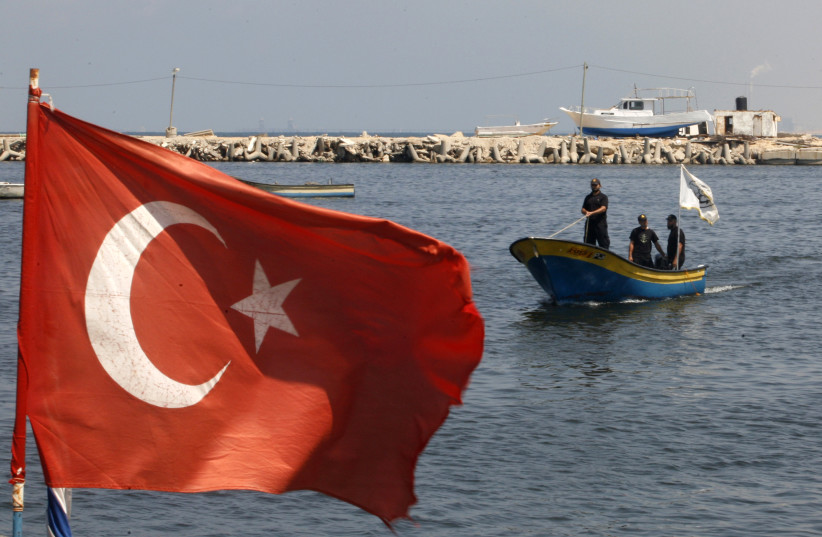Turkey’s foreign minister said Turkey declined a request by Israel to deport Hamas members, according to reports, amid fears that Ankara’s rapprochement with Israel will suffer after the electoral victory of former prime minister Benjamin Netanyahu.
For more stories from The Media Line go to themedialine.org
Mevlut Cavusoglu reportedly said last week that Turkey did not accede to a request that it deport members of Hamas, made last month by Israel’s outgoing Defense Minister Benny Gantz during a visit to Ankara.
“We did not meet a demand regarding Hamas. We do not see Hamas as a terrorist organization,” said Cavusoglu, according to the Turkish news outlet Sozcu.
"We do not see Hamas as a terrorist organization"
Turkish Foreign Minister Mevlut Cavusoglu
Turkey, Erdogan want to be Middle East peacemakers
Omer Özkizilcik, a foreign policy and security analyst based in Ankara, told The Media Line that Turkey is hoping to become a mediator between Israel and the Palestinians, and believes deporting Hamas members could jeopardize that.
“We remember that, before Turkish-Israeli relations broke down, Turkey was an honest broker between the Palestinian side and the Israeli side, and I think Turkey is looking forward to re-establishing that,” he said.

Özkizilcik added that since Turkey does not classify Hamas as a terrorist organization, there would not be a legal framework to deport its members.
Diplomatic relations between Israel and Turkey were fully restored over the summer with Israel appointing an ambassador to Turkey in September, and Turkey naming an ambassador to Israel on Friday.
While the countries maintained ties without ambassadors, including in trade, tourism and security, Turkey’s position on Hamas was always a key concern for Israel.
Özkizilcik says he does not believe the issue will have a major effect on relations between Turkey and Israel.
Instead, he believes the change in government in Israel – which will see Netanyahu returning to office, and the upcoming election in Turkey would have much more of an impact on ties.
Erdogan and Netanyahu's tense relationship
Turkish President Recep Tayyip Erdogan has had a tense relationship with Netanyahu, with both leaders exchanging insults over the years.
In 2018, Erdogan stated that the killing of dozens of Palestinian protesters by Israeli forces was genocide.
Afterward, Netanyahu tweeted: “Erdogan is among Hamas' biggest supporters and there is no doubt that he well understands terrorism and slaughter. I suggest that he not preach morality to us.”
Erdogan responded by tweeting that the Israeli prime minister heads an “apartheid state.”
“The Turkish-Israeli rapprochement [and] normalization of relations is not based on anything regarding the Palestinians and Palestinian parties, but more on geopolitical realities and energy and economic realities,” Özkizilcik said. “It’s a common-interest approach.”
Gabriel Mitchell, director of undergraduate studies at the University of Notre Dame at Tantur in Jerusalem, told The Media Line he believes the foreign minister’s statement on Hamas was an attempt to draw Netanyahu into negotiations to continue the rapprochement.
“I see this as a way for Erdogan to say there’s a bigger prize available if Netanyahu is willing to meet in the middle and so I think that essentially the normalization negotiations are effectively back on,” he said.
Mitchell says that the fact that members of Hamas are living in Turkey is one of the biggest obstacles in restoring full relations, and believes if Netanyahu had been prime minister an agreement on diplomatic ties would not have been made without Ankara taking concrete steps against Hamas.
“I certainly saw that as Israel kind of backing down on a core principle,” Mitchell said.
“Turkey understands that a Netanyahu government is not going to be as eager to fully restore or move on a path to normalization than the previous government,” he added.

Erdogan continues attempts to improve relations
The thawing of ties with Israel is part of a broader attempt by Erdogan to improve relations with countries in the region and the West in the hopes of attracting foreign investment to his country, which has been struggling under a devalued currency and massive inflation that is officially reported at more than 80%.
The restoration of full diplomatic ties with Israel has been a success story amid lukewarm responses by many countries, notably the US, to the Turkish president’s overtures.
Turkey repeatedly has expressed its interest in energy cooperation with Israel, although that is fraught with several geopolitical complications involving Ankara’s poor relations with other countries in the region that work with Israel.
Mitchell pointed to technology and renewable energy as two areas that would be top interests in developing deeper economic ties and bilateral trade.
“Diversifying and growing and incorporating new stakeholders in that partnership is the principal goal for both parties but in particular for Turkey, whose economy is suffering,” he said.
